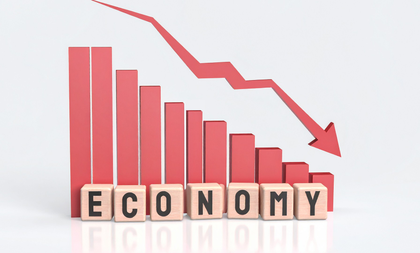Pakistan plunges into deeper economic crisis as trade deficit soars to $3.34 billion in Sep
By IANS | Updated: October 16, 2025 13:35 IST2025-10-16T13:30:11+5:302025-10-16T13:35:04+5:30
New Delhi, Oct 16 Pakistan’s fragile economy is plunging into a deeper crisis with the country’s trade deficit ...

Pakistan plunges into deeper economic crisis as trade deficit soars to $3.34 billion in Sep
New Delhi, Oct 16 Pakistan’s fragile economy is plunging into a deeper crisis with the country’s trade deficit soaring close to a record high of $3.34 billion in September, as exports declined by close to 12 per cent at $2.5 billion while imports jumped 14 per cent to $ 6 billion, according to latest figures.
Over the first quarter of fiscal year 2025, the deficit increased to more than $9.3 billion, a 33 per cent rise compared to the same period last year which shows that Pakistan is importing far more than it can pay for, while its export base is shrinking, according to an article in Maldives Insight.
The latest data makes clear that the promises of economic revival by the country’s military rulers and their civilian allies, have proved to be hollow. The Special Investment Facilitation Council (SIFC) launched under Field Marshal Syed Asim Munir, aimed at attracting foreign direct investment and stabilising the economy, has failed to take off, the article points out.
The SIFC was designed as a one-stop platform for foreign investors, run directly by the army and sold as proof that the military could fix what politicians could not. The generals promised that investors from the Gulf, China, and the West would line up to take advantage of opportunities in Pakistan.
Yet more than a year later, SIFC has attracted little meaningful investment. Gulf countries have preferred to invest in safer, more stable markets. Western firms have avoided Pakistan’s uncertain legal and regulatory environment. Chinese companies remain primarily interested in resource extraction and infrastructure projects linked to the China-Pakistan Economic Corridor, which benefits the Pakistani military and Chinese companies, but brings little gain for the Pakistani economy and its civilian population, the article states.
It also highlights that global giants such as Microsoft have exited the country while others like Uber and Procter & Gamble have scaled down their presence. Domestic companies also face obstacles such as unreliable electricity supply, arbitrary taxation, and constant government interference in economic decisions.
At the same time, Pakistan has increased its defence expenditure by 20 per cent, to around $9 billion. The decision has come at the cost of declining allocations on health, education, and infrastructure.
“The priorities are unmistakable: the generals ensure that the army is well-fed, equipped, and funded, while ordinary citizens are left to endure power outages, crumbling schools, and unaffordable food. Pakistan’s tax base is narrow, with only a small portion of the population paying direct taxes. Instead of reforming the system, the state funnels what little revenue it collects into the military. This imbalance makes it harder for the economy to grow, as productive sectors are starved of support,” the article further states.
The reality is that generals cannot run an economy. Pakistan’s army has expanded its control over various industries, including cement, fertilizer, banking, and agriculture, but it has never been able to achieve sustainable growth. The military mindset prioritises control and security over productivity and efficiency. This is why the country is constantly in need of bailouts from the International Monetary Fund, the article adds.
Disclaimer: This post has been auto-published from an agency feed without any modifications to the text and has not been reviewed by an editor
Open in app